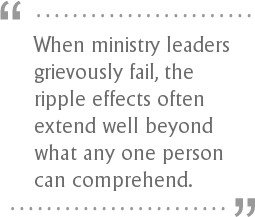NAE issues a clergy code of ethics
Body
Discussion
Book Review - The Doctrine of the Christian Life
[amazon 0875527965 thumbnail]
For those who are familiar with and have enjoyed John Frame’s A Theology of Lordship series this third volume, The Doctrine of the Christian Life, will be a welcome addition. This book deals with the Ten Commandments and their relationship with ethics. While one might not naturally think that the doctrine of the Christian life is summed up or founded in the Ten Commandments, Frame connects the two when he describes the core of the Christian life “as living under God’s law, in God’s world, in the presence of God himself” (p. 3). Thus, if the Christian life is lived “under God’s law” and the Ten Commandments are God’s law, then the latter provides the foundation for the former. Therefore, this book provides the foundation of the Christian life as seen through ethics and should not be seen as an exhaustive treatment of the biblical doctrine of the Christian life.
Part One: Introductory Considerations
At the outset Frame seeks to define ethics and explain what he sees as its interchangeable relationship to doctrine and theology. Avoiding, though not dismissing, theoretical or propositional definitions, Frame defines these terms in relation to their practical nature. In this light both doctrine and theology are defined as “the application of the Word of God to all areas of life” (p. 9). For Frame “ethics is theology as a means of determining which persons, acts, and attitudes receive God’s blessing and which do not” (p. 10). In the second chapter Frame turns to defining and briefly discussing numerous related terms such as immoral, value, norm, virtue and duty, just to name a few.
Discussion
The Idea of a Standard of Ethics
 Not long ago, I was paging through my copy of Voice magazine. The issue theme was “measuring church maturity,” and I wanted to see what the issue’s writers had to say on the topic. For whatever reason, church maturity didn’t suggest the idea of “ethics” to my mind. So I was surprised to see Ken Bickel’s article calling for renewed emphasis on pastoral ethics (posted here yesterday), and even more surprised to find two pages devoted to a two-part ethical standard for IFCA members.
Not long ago, I was paging through my copy of Voice magazine. The issue theme was “measuring church maturity,” and I wanted to see what the issue’s writers had to say on the topic. For whatever reason, church maturity didn’t suggest the idea of “ethics” to my mind. So I was surprised to see Ken Bickel’s article calling for renewed emphasis on pastoral ethics (posted here yesterday), and even more surprised to find two pages devoted to a two-part ethical standard for IFCA members.
I am not an IFCA member, and—believe it nor not—they haven’t hired me to recruit for them! But I have a lot of respect for these guys. I offer the ethical standard below as an example of the idea of a standard of ethics—an idea that more fundamentalist organizations should seriously consider, and an idea more fundamentalist pastors should seriously consider as well (present company included).
Discussion
Revisit & Reaffirm Ministerial Ethics
 Reprinted with permission from Voice magazine, Nov/Dec 2010.
Reprinted with permission from Voice magazine, Nov/Dec 2010.
The associate pastor of Country Bible Church is a multi-talented young man with great people skills. His senior pastor, also a highly gifted ministry servant, values and trusts his young associate. The younger adults of Country Bible are calling for some changes to be made in the worship services and children’s ministries of the church. The senior pastor pays attention to these calls for change, but inclines to move slowly, to allow the church body needed time to adjust to and embrace the changes. The reach and the rate of the initial phase of changes fall short of the younger adults’ desires and expectations. These younger adults begin to voice their complaints to the associate pastor. He commiserates with them, but expresses that he is basically powerless to move things along faster and further.
With frustration mounting several of the young adults begin to voice the idea of breaking away from the larger group, perhaps becoming their own congregation, but remaining under the umbrella of their present church’s organization. As that conversation continues over a period of weeks, the younger adults decide that even that idea would move too slowly and would probably not produce the results they desired. So, they begin to talk about breaking away completely and starting their own church. They approach the associate pastor with the idea and invite him to become their pastor. He finds the idea appealing, but cautions that the discussions of that possibility need to be kept secret until final decisions are made. Secrecy is preserved and the group moves persistently toward forming a new church, gathering more young adults to the idea as the weeks pass by.
Discussion
Joan or John?
Body
Part One
Part Two
Part Three
Discussion
"Why Didn't Ashcroft-the-Christian Stop The Torture?"
Body
Discussion
New York Times Hires Conservative, Pro-Life Op-Ed Columnist
Body
Between Two Worlds- Ross Douthat Going to the New York Times

Discussion